I always get a little garden envy during the summer months.
While I have the best memories of hand-picking sweet, fresh tomatoes and jarring them with my parents and brothers when I was growing up, the past few years have been… well, different.
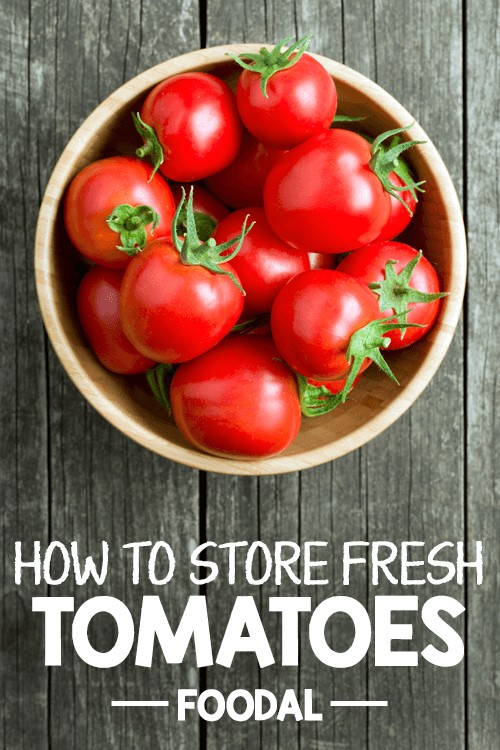
More recently, I have lived in a variety of city apartments throughout Pittsburgh, Boston, and Philly, always with a severe lack of outdoor space to start my own personal garden.
I live vicariously through my parents’ garden back in Western Pennsylvania. And I call home often to receive the latest updates about the rapidly ripening plants.
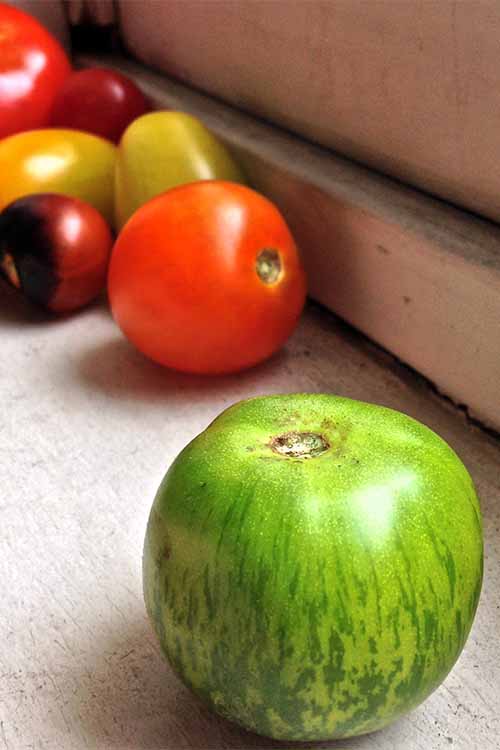
My mom and dad have completely torn out our old childhood swing set to create their own backyard oasis of garden goodies, including a vine-laden jungle of tomato plants.
Needless to say, they always have plenty of Romas, grapes, and cherries ripe for picking.
I’m sure many of you have a similar situation at home, with a bountiful harvest! When you’re not making your next batch of red sauce or giving away extras to friends and family, how do you store that continually growing supply of all the other ones you want to keep?
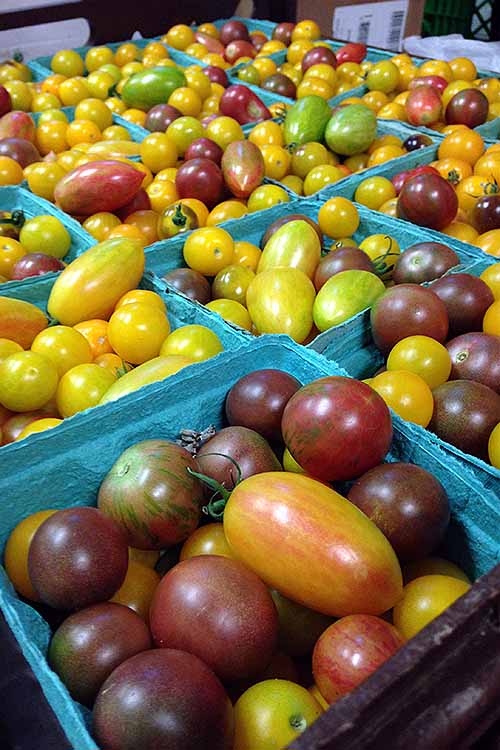
And if you’re like me, living in the city and relying on local farmers markets or CSAs for your fresh tomato needs, what are you supposed to do with them after you get home with your tote bags full of fresh finds?
No matter if you’re a city slicker or a devoted garden steward, keep reading below for our go-to guide to storing your next crop of delicious tomatoes!
How to Choose the Best One
If you need more guidance for picking the right tomato, Foodal already has plenty of information on how to select the best tomatoes – ripe, plump, and juicy!
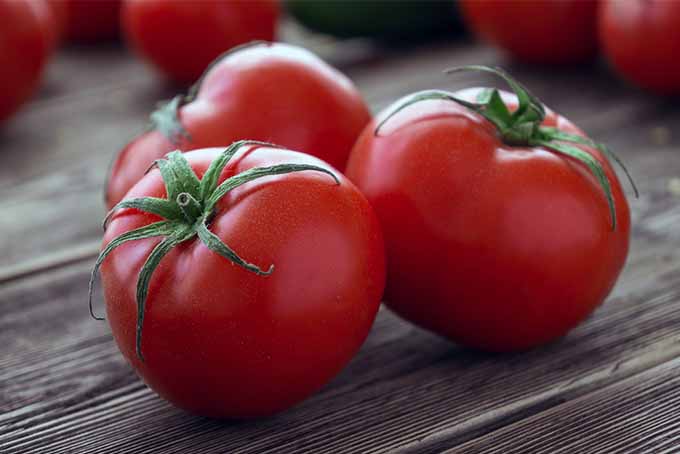
Washing & Cleaning
To extend the freshness of these fruit/vegetables (depending on who you ask), we recommend that you wait to wash and clean them until you are ready to eat.
They should not be washed before storage, since extra moisture will accelerate the growth of mold. And mold is not what you want to find when you’re cutting into them for your next bruschetta recipe!
When you are ready to prepare them, just rinse under the sink and rub with a towel to remove excess dirt.
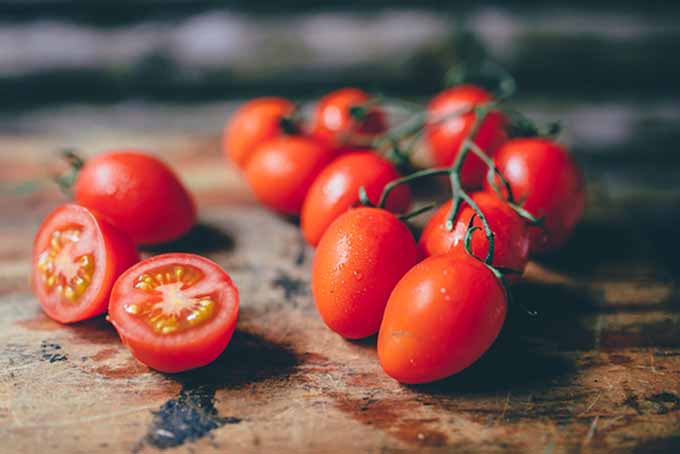
Room Temperature Storage
Plain and simple, we recommend storing tomatoes at room temperature in a single layer, uncovered, and away from direct sunlight.
Storing them in a single layer is essential to help them last longer. Try to avoid stacking on top of one another.
I have been guilty of plopping all of my fresh produce in just one bowl after rushing home from the market, and end up forgetting altogether to store them properly afterwards.
The consequences of this kind of forgetfulness aren’t pretty.
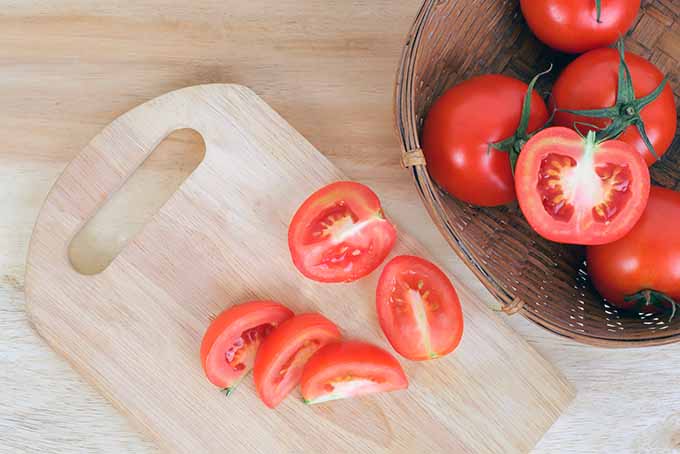
If they are packed together, airflow is severely limited. Tomatoes are incredibly delicate, especially when ripe.
This not only crushes your precious produce, but will also accelerate ripening and the onset of mold. And it will attract fruit flies. Yuck.
Your countertop is the perfect place for storing them at room temperature. The openness gives these round beauties the right amount of air exposure. And all those heirloom varieties will look gorgeous on display!
A platter of colorful tomatoes versus a bouquet of fresh flowers? It’s close competition.
When Refrigeration Is Necessary
While room temperature tomatoes are the best to develop the most vibrant flavors, you can refrigerate them.
We recommend refrigeration for the following reasons:
If they are very ripe, but you are not ready to use them immediately, it is best to refrigerate to preserve and extend their life expectancy.
If you decide to cut them ahead of time, it is imperative that you store them in the refrigerator until ready to serve and eat.
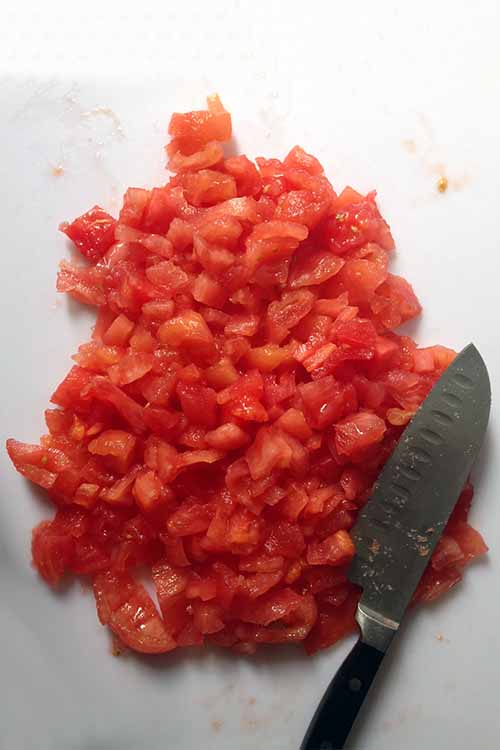
According to ServSafe Coursebook, the textbook created by the National Restaurant Association for food safety and sanitation, certain food items like a freshly cut tomato are identified as TCS foods.
TCS means “time/temperature control for safety.” The time and temperature at which these foods are held need to be carefully monitored. They are particularly susceptible to unsafe contamination, and attract potentially harmful pathogens more rapidly than other food items.
TCS foods also include items like sliced melons, fresh proteins (such as poultry, meat, fish, and tofu), eggs, dairy products, sprouts, and heat-treated plant foods like rice, beans, and other vegetables.
Here is the basic rule: you should not leave TCS foods out for more than 4 hours at room temperature. Refrigerate them properly (below 41°F) to maintain safe storage.
Store freshly cut tomatoes in an airtight plastic container or zip-top bag in the refrigerator. It is best to use them as soon as possible, within 2-3 days.
Just remember, refrigeration is necessary whenever you cut into a fresh tomato!
Freezing Your Haul
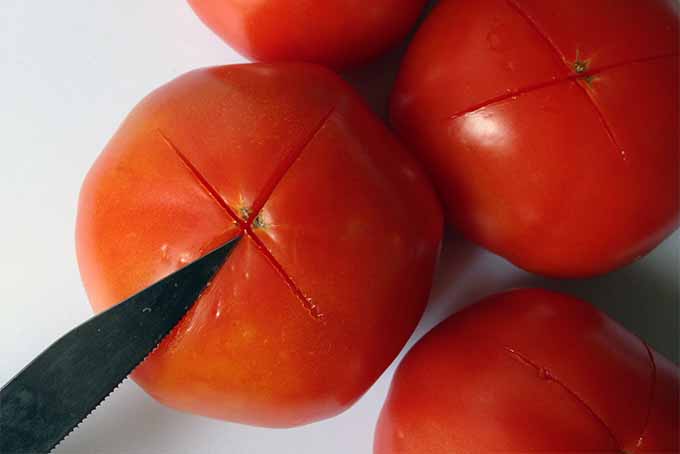
If you are a freezer fanatic, this is a very easy and low-maintenance vegetable to freeze.
While you can simply freeze whole tomatoes to be used later on, you can also add a few extra steps of preparation before freezing.
The culinary prep method called concassée, from the French concasser or “to crush or grind” is basically a rough chop that can be applied to a variety of vegetables, most often seeded and skinned toms.
It’s ideal for preparing larger, juicier varieties like plums and beefsteaks for freezer storage. They will be ready at a moment’s notice to add to your recipes once thawed.
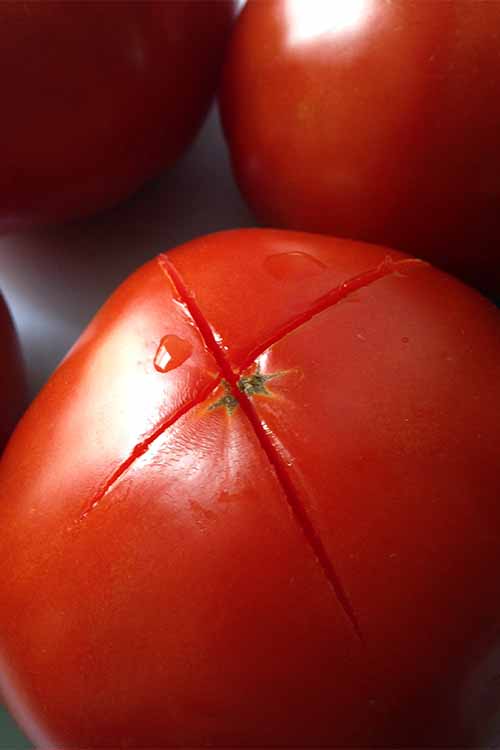
Concassée tomato preparation follows three main steps: peel, seed, and dice.
This method isn’t just limited to freezer storage – it’s a simple technique that can also be applied to any recipes where you do not want the texture of the skins or the extra juice from the seeds.
Store the tomatoes in zip-top freezer storage bags, being sure to push out all that extra air to create the best seal and long-lasting storage.
To save as much room as possible in your freezer, spread the tomatoes out in the bag to form one thin layer. Once frozen, you have a thin sheet that can easily be stacked with other frozen items.
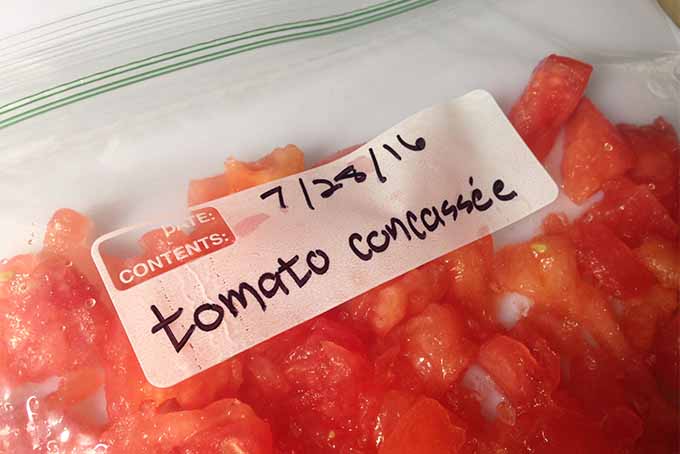
And don’t forget to date the bag!
Labeling with the item’s name and the date it was made will keep your freezer well organized, and your busy mind relieved! Use the FIFO (first in, first out) method as well, storing older items on top and in the front of your freezer, so these will be used up first.
This product can be stored in the freezer for up to 6 months.
To safely thaw the tomato concassée, the best method is to slowly thaw in the refrigerator overnight. Because the fruit is already cut into smaller chunks, this shouldn’t take more than 8-12 hours.
The night before you plan to make your recipe, simply place the frozen bag in a large bowl (to collect condensation) and place it immediately in your refrigerator.
The Recipe
- Fresh tomatoes
- Cut shallow x-shaped slits through the skin on the bottom of each tomato with a paring knife.
- Using a large slotted spoon, carefully place the prepared tomatoes in a large pot of boiling water so they are fully submerged. Blanch for 30 seconds.
- Using the same slotted spoon, immediately transfer the tomatoes to an ice bath. Allow them to cool for about 5-10 minutes.
- Once cool, cut out the core of the each tomato with a paring knife and discard.
- The skin will peel off very easily with a paring knife. Peel each tomato.
- Cut each tomato in half and squeeze out the seeds and juice into a separate bowl.
- Cut the flesh to the desired size and shape for your recipe.
Remember: waste not, want not! The seeds and juice can be used in your next batch of tomato sauce – there’s a lot of good flavor in there! Or the skins, cores, and seeds can all be composted.
Not ready to use the discarded portions immediately? Store in an airtight container in the fridge for up to 2-3 days, or in the freezer for up to 6 months.
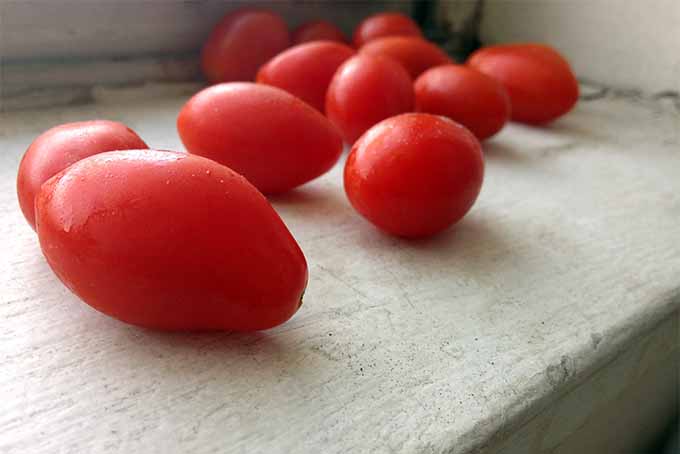
Cooking By the Numbers…
Step 1 – Boil & Cut
Before you start, put a large pot of water on to boil. The size of course depends on how large your batch is, but you want the water to be about twice the volume of your produce.
Not only do you want all of the tomatoes to be completely submerged, you want to boil enough water that adding them doesn’t reduce the temperature significantly.
Prepare a large bowl of ice water as well. Again, you want the volume of ice water to be about double that of your tomatoes.
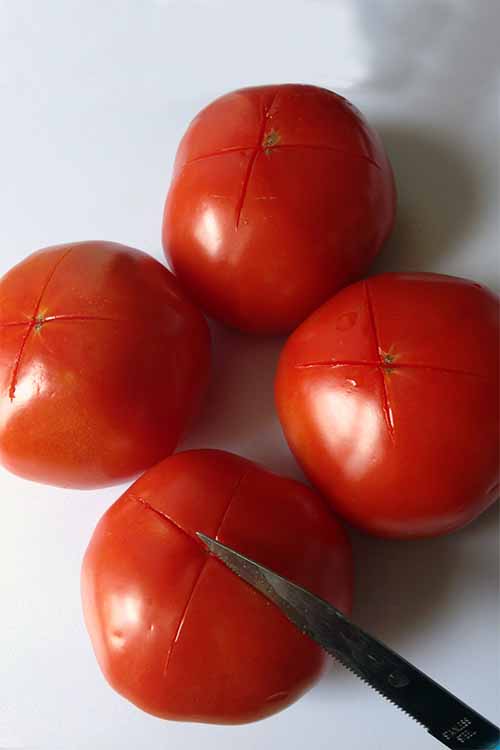
Now you are ready to prep those tomaters: cut a shallow x-shaped slit in the bottom of each one.
Step 2 – Blanch
Gently place the tomatoes into your pot of boiling water. Using a slotted spoon for this task will make it easy to transfer them in and out of the boiling water without running the risk of splashing on yourself.
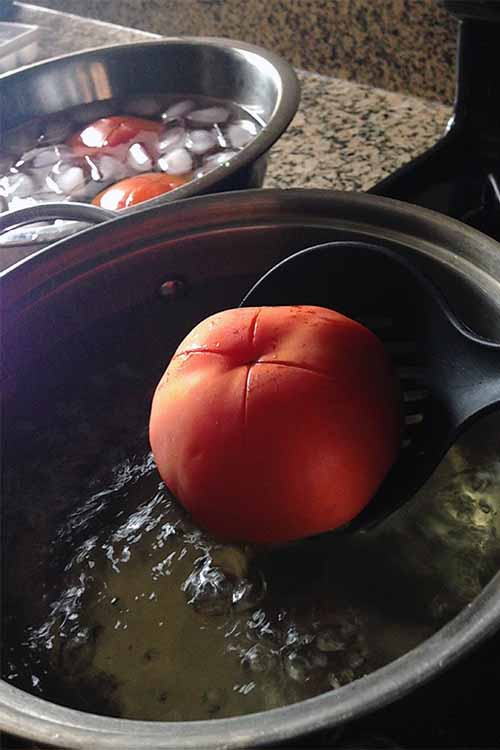
Make sure all of the fruit is completely submerged, and let it sit for about 30 seconds.
Step 3 – Chill
Using that same slotted spoon, take the tomatoes out of the boiling water and drop them straight into your bowl of ice water. Again, be careful so as not to burn yourself! That water is hot!
Chilling the tomatoes will stop the cooking abruptly, which helps them to maintain their vibrant red hue, and keeps them from dissolving into a mushy mess.
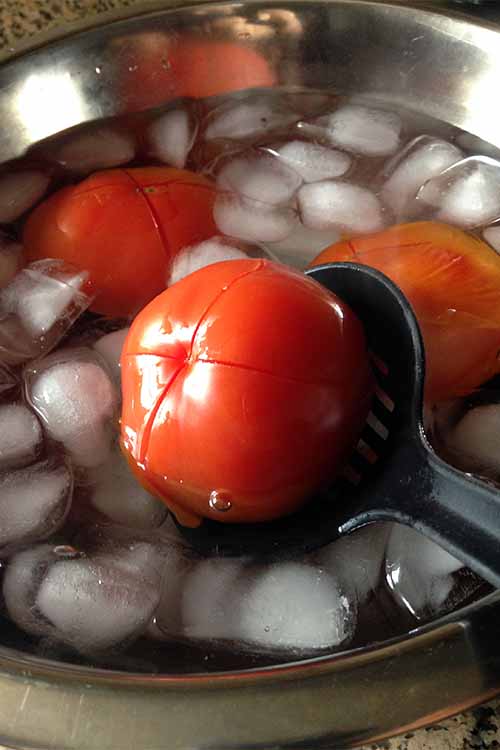
Let those toms rest in the ice bath for 5-10 minutes, to bring the quick cooking that they received to a complete stop.
Step 4 – Core
Using a paring knife, cut out the cores. This is usually pretty shallow, so be careful not to take too much of the flesh with it!
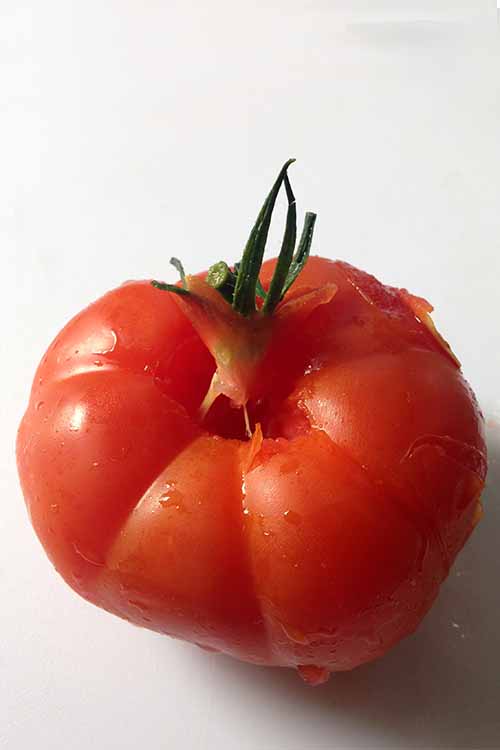
Step 5 – Peel
Now use your paring knife to peel the skin from the fruit. It will come off really easily, thanks to your x technique!
Start with the edges where you initially sliced and pull downwards. The skin should slide right off.
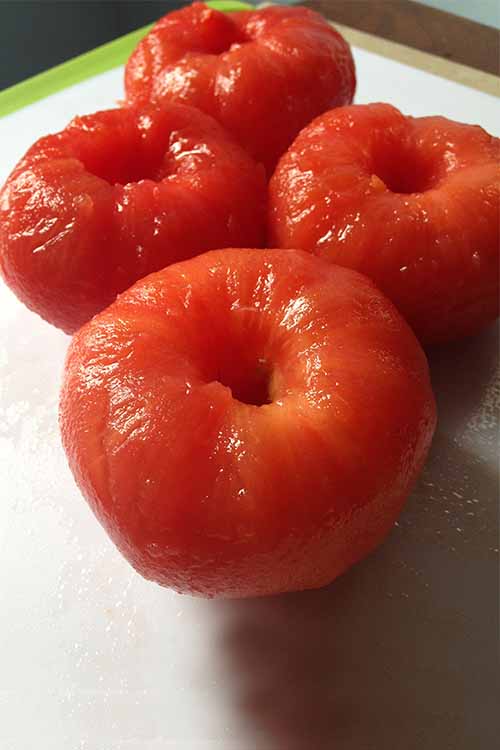
At this point, you can also use the whole peeled tomatoes for a delicious recipe, like our Italian pappa al pomodoro.
Step 6 – Halve & Squeeze
Slice each fruit in half and squeeze the seeds into a separate bowl.
Don’t let the tasty insides go to waste – there are countless ways you can harness their flavor. Toss the juice and seeds into a batch of homemade sauce, a fresh juice base for spicy bloody marys, a bowl of vegetable stock, or even a healthy V8-style tomato juice!
If all else fails, this also makes an excellent addition to your compost!
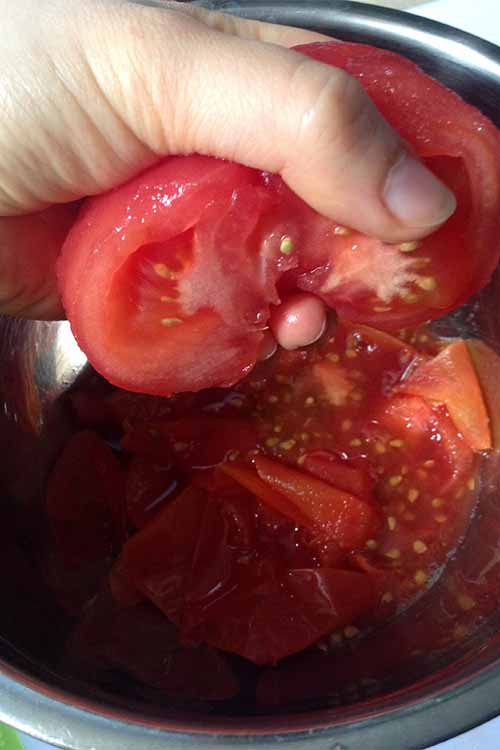
Step 7 – Chop
Now just chop, slice, or dice the flesh into whatever shape suits your cooking needs, and it is ready to store!
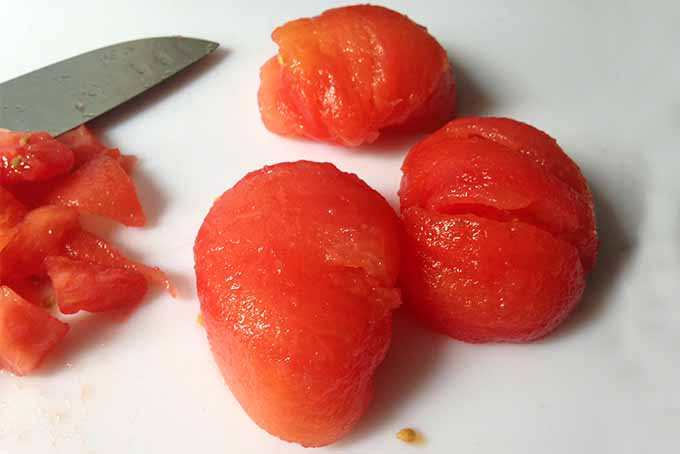
You just mastered the concassée technique!
Now what? Go ahead and prep your tomatoes for the freezer, or use them now in Foodal’s recipe for pico de gallo!
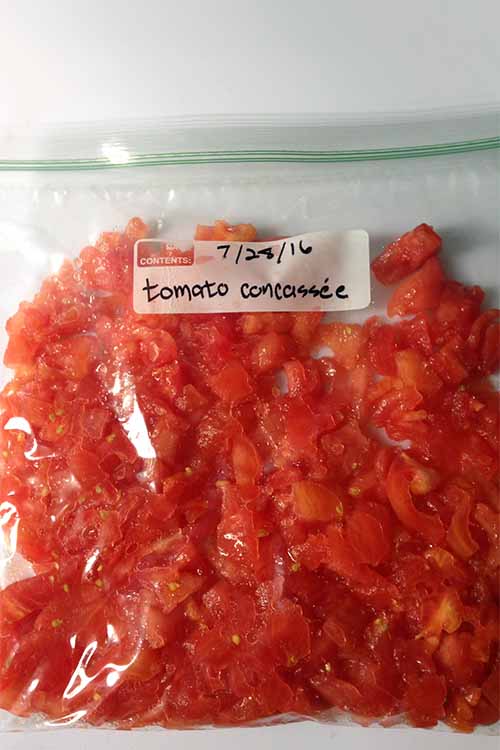
No matter where you get your plums or beefsteaks, from your own backyard or from the market, and no matter how you’re preparing them, whether for pico de gallo or a Nicoise salad, proper storage is necessary to maintain the perfectly ripe essence of each tomato!
Do you have any tricks of the trade for successful tomato storage? We would love to know! Share your comments below!
Photos by Nikki Cervone, © Ask the Experts, LLC. ALL RIGHTS RESERVED. See our TOS for more details. Uncredited photos: Shutterstock. Additional writing and editing by Kendall Vanderslice and Allison Sidhu.
About Nikki Cervone
Nikki Cervone is an ACS Certified Cheese Professional and cheesemonger living in Pittsburgh. Nikki holds an AAS in baking/pastry from Westmoreland County Community College, a BA in Communications from Duquesne University, and an MLA in Gastronomy from Boston University. When she's not nibbling on her favorite cheeses or testing a batch of cupcakes, Nikki enjoys a healthy dose of yoga, wine, hiking, singing in the shower, and chocolate. Lots of chocolate.


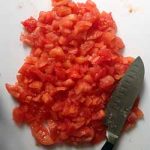



This is such a cool post, those are great ideas for storing tomatoes. Sometimes it’s kind of frustrating when it’s not really the tomato season, but you want to cook a dish including this versatile veggie.
I don’t really have other methods when it comes to storing them, keeping them in the fridge make them last a little bit more and I have lately started to freeze fruits and they last a lot of more time. So, freezing, it’s probably my favorite method.
Thanks for sharing!
Alright, well thanks for the information, and I need to remember A SINGLE LAYER. I need to write this down in huge letters and post it somewhere in my kitchen, because this is the mistake that I make all the time. I am like you, I will throw them all in a bowl just for a matter of convenience and then forget about them. Hopefully I make the ones that I just bought yesterday last a little longer than usual. Thanks again for sharing the tips, and it is perfect for the summertime chef, which I like to consider myself a bit of.
I’m truly lucky to stay in a place where the farmers markets are always available and stocked with every imaginable fruit and vegetable you could want. I’m just wondering, being new to cooking and all… I hear people talking about ‘not in season’ But we always have tomatoes all year round. That being said, it is great to learn how to make the tomatoes that I buy last longer and not always have to throw some out like we normally do when the bottom ones get rotten.
This is a really great method for ensuring that you have the vegetables you need to use at a moments notice. It’s also going to save a lot of people a great deal of money in the long run as there wont be so much wastage. Thank you for sharing this.
Tomatoes – all varieties – are one of m favourite foods. I am sadly never able to grow them very well, and my last efforts yielded around nine tomatoes per plant. I won’t give up, however!
This article contains a wealth of good information for a tomato lover like myself! I have grown tomatoes for as long as I can remember. We always canned them, but I never gave much thought to freezing them. This will be an excellent way for me to have garden-fresh tomatoes for all of my hearty soups this winter, instead of buying the heavily salted canned good variety I end u.p settling for once all of our home-canned jars are depleted.
I just learned something today, I learned what the French call what I’ve been doing for years with my tomatoes. I actually like how fancy it sounds, lol. From now on, I’m going to write concassee on my storage bags too.
Thanks for the great guide! I absolutely love fresh tomatoes, and this is definitely one of the best times of the year to buy them. I like eating them with pasta or rice, so I’ve never had the opportunity to make them as a standalone dish, like the recipe you created. I’ll definitely be giving this a try, but first, I have to buy a few. I ended up leaving them all together in a bowl, same as you. The fruit fly attraction definitely wasn’t edible, so now, I have to go out of my way to get more. It kind of stinks, but I’ll definitely put more care into properly looking after them in the future. Thanks for the post!
Okay, this is some really good stuff to know. Keeping my “maters” out of the fridge has definitely made them last longer. I wish I had learned this sooner. I always assumed they should be chilled, since they usually are at the store. Of course, I should have known better with garden ones or the ones from the farmer’s market, since those are kept warm. I guess I just go into the (bad) habit of sticking them into the crisper with other fresh veggies.
Thanks for the other tips as well. Hubby loves these, and now I can do more with them.
Well, this is quite interesting. For some reason, I have always stored my tomatoes in the fridge. I have been wondering if this is the correct way to store them because they go bad very quickly. Glad I finally found something that may work. I suppose i’ll be leaving the tomatos on the counter from now, on.
This is great, I was worried about freezing my tomatoes but you’ve put those worries to rest. I don’t expect them to be perfect, but the fact that I’ve never (personally) seen frozen tomatoes at the grocery store made me worried that the only long-term solution for storage was canning them! Glad to see I DO in fact have other options, thanks!
Thanks for sharing! I love tomatoes! They’re one of the must-haves of our kitchen. I have tried buying them in bulk. I stored them in the crisper like what I usually do but most of them still turned bad. I now know that I have been doing this wrong. This article is really helpful. I still have a few tomatoes in the fridge, but the next time I buy them, I’ll follow the proper way to preserve them.
Wow! I finally found a way to stop my tomatoes from rotting. This is some good information, now I will put this in practice to see what the final results are, thank you for sharing this! Really appreciated.
It’s nice too know when to put them in the fridge. I usually store them on the counter but there are definitely times it would have been nice to put them in the fridge. I like this method of freezing as well. Next time I have too many tomatoes I will just chop them up and freeze them!